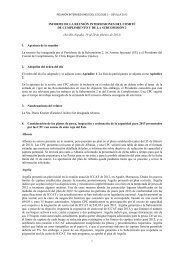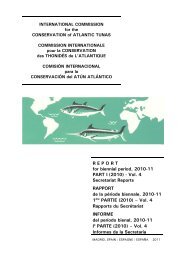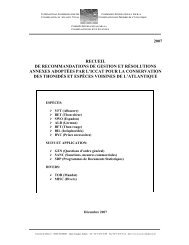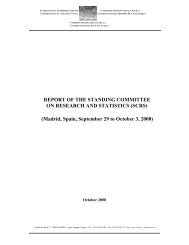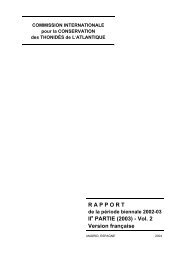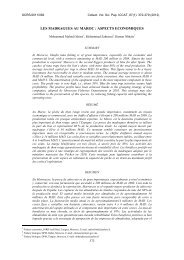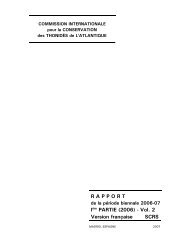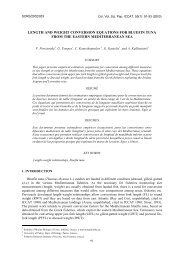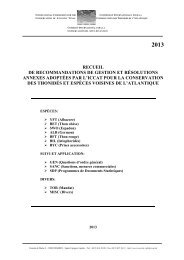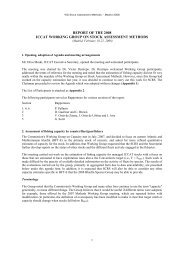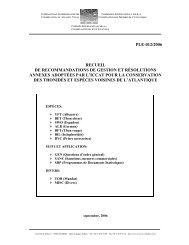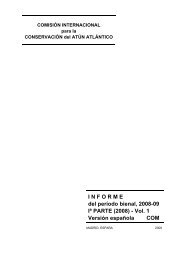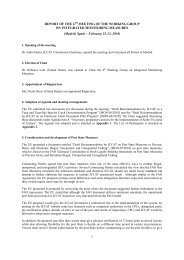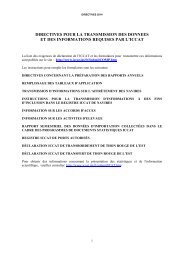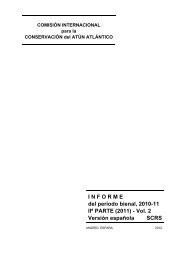E - Iccat
E - Iccat
E - Iccat
Create successful ePaper yourself
Turn your PDF publications into a flip-book with our unique Google optimized e-Paper software.
ICCAT REPORT 2012-2013 (I)<br />
The Plan has been growing more and more stringent, and some of the measures have proven to be difficult to<br />
implement. Some have yielded doubts as to their efficiency. Thus, we believe that now is the right time to<br />
reconsider some of the elements. We are all aware of the positive impact of the plan, but Croatia also fully shares<br />
the views that it should be further strengthened in some elements in order to make sure that its further<br />
implementation yields even better results in the future.<br />
As Croatia has stated in previous years, we believe that regional specificities of population structure and<br />
dynamics govern the nature of the fishery, and these specificities should be taken into consideration when<br />
discussing seasons, sizes, capacities or any other management measures. With the specificities of its fishery,<br />
Croatia has some concerns as to the underlying assumptions in the methodology of capacity measures. With a<br />
different type of fishery in the Adriatic from the one operated in the Mediterranean, and with the capacity cuts<br />
already taken, we are concerned as to the viability of the activity as a whole.<br />
Croatia believes that albeit a small increase, reverting to the 2010. TAC of 13,500 t should be the course to take.<br />
It will be a signal to everybody that the hard and difficult sacrifices made do pay off, and that continuation and<br />
strengthening of the plan for the forthcoming period may yield even better results leading to further increases in<br />
the TAC.<br />
European Union<br />
The European Union would like to express its deep appreciation to the Kingdom of Morocco for hosting the 18 th<br />
Special ICCAT Meeting in this beautiful city of Agadir. We would also like to praise the hard and excellent<br />
work done by the Executive Secretary, Mr. Meski, and the Secretariat throughout the year and for the<br />
preparation of this meeting, as well as wish all the best to our new Chair, Mr. Miyahara.<br />
Over the last few years, ICCAT has substantially improved its performance and as such has rightfully raised high<br />
expectations from the civil society and the fishing industry on its role and capacity to manage fish stocks under<br />
its competence. The European Union firmly believes that ICCAT should keep up the momentum and continue<br />
promoting measures that further enhance the efficiency and effectiveness of the Organisation, and thus the<br />
sustainable management of resources under its purview.<br />
To that end, the European Union believes that ICCAT should give priority to the core element of a sound<br />
fisheries management system: Science. ICCAT showed its commitment over the past few years in getting the<br />
best possible science, and the SCRS is providing managers with high quality scientific advice. This does not<br />
mean that we cannot do better. The Resolution by ICCAT on Best Available Science [Res. 11-17] adopted last<br />
year paves the way for even better science and therefore we should make sure this year that ICCAT lives up to<br />
the commitments made last year.<br />
On the conservation side, ICCAT will focus on bluefin tuna as the multi-annual recovery plan is due for review<br />
this year. The European Union welcomes the positive signs concerning the recovery of the stock. This suggests<br />
that the current management measures and the substantial efforts undertaken by the Contracting Parties are<br />
paying off. However, scientific advice stays cautious in view of the many uncertainties around the stock<br />
assessment. We hope therefore, that ICCAT Contracting Parties will be strongly committed to ensuring a<br />
continued trend in the recovery of the stock. Besides, the bluefin tuna recovery plan needs to be adapted to new<br />
realities and to the development of the fishery. Measures to better control farming activities and initiatives to<br />
further improve the traceability for this species should be envisaged. Launching the full implementation of an<br />
electronic Catch Documentation Scheme (eBCD) will be an important step in that regard and pave the way for<br />
similar traceability schemes for other species.<br />
Still, on the conservation side, we hope that ICCAT will continue promoting the protection of vulnerable sharks<br />
species, in particular porbeagle and shortfin mako. The European Union is confident that its inter-sessional<br />
efforts to find consensus on its porbeagle proposal will yield success. The European Union also hopes that<br />
ICCAT adopts rebuilding measures for marlins that take into account all causes of mortalities, as outlined by the<br />
scientific advice for both blue marlin and white marlin.<br />
To make sure that conservation measures yield success, the European Union expects ICCAT to further enhance<br />
monitoring and control measures this year and commends the Working Group on Integrated Monitoring<br />
Measures for the proposals submitted to the ICCAT Commission. Establishing an in-port inspection scheme will<br />
be a significant step towards the implementation of the FAO Port State Measures Agreement and introducing<br />
traceability for species other than bluefin tuna will further advance ICCAT in its fight against IUU. In recent<br />
50



